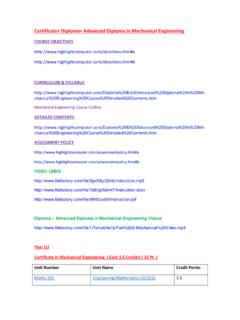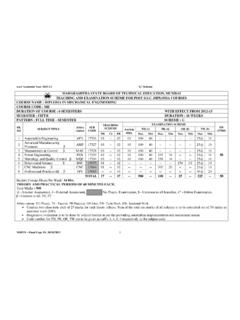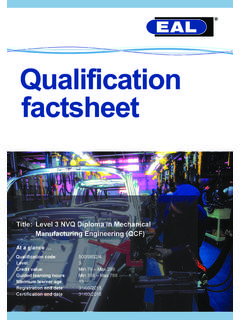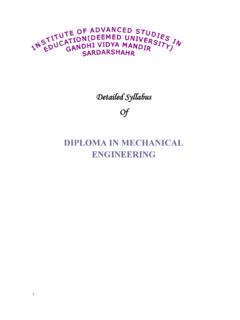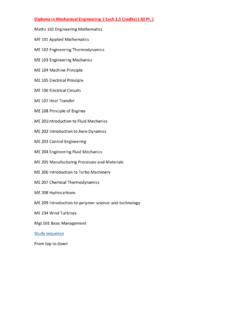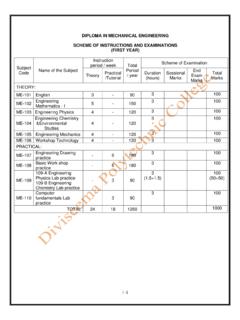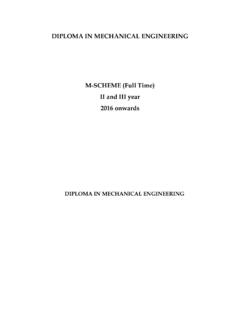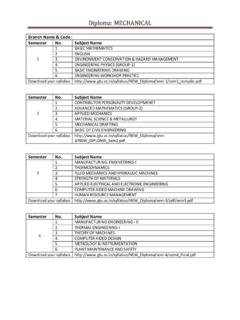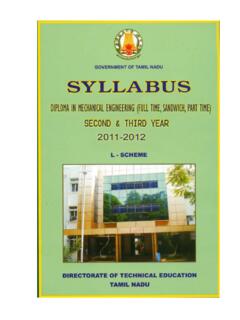Transcription of Diploma Course in MECHANICAL ENGINEERING
1 Shri Vile Parle Kelavani Mandal s SHRI BHAGUBHAI MAFATLAL POLYTECHNIC NATAKKAR RAM GANESH GADKARI MARG VILE PARLE (WEST), MUMBAI-400056 CURRICULUM Shri Bhagubhai Mafatlal Polytechnic started 03 year s Diploma courses and affiliated to the Board of Technical Examinations, Maharashtra State, in 1963. Since 1969, academic freedom was granted to the Polytechnic, which enabled it to evolve curriculum and examination scheme and to introduce inplant training, resulting into industry institute interaction. Thus 4 years semester sandwich pattern came in existence. Since 1978-79 academic freedom was extended to all the full-time Diploma courses. In 1989-90, full autonomy was granted to all seven full-time Diploma courses. As a further development to the above, the Multi-Point Entry and Credit System (MPE&CS) was initiated in 1981 on the progressive basis. In the scheme students can regulate their pace of studies within the rules prescribed.
2 From 1993-94, full academic autonomy was extended to all the courses. (Full Time 04 Year Sandwich Pattern) Diploma C ourse in MECHANICAL ENGINEERING (Aided) The Diploma Courses in MECHANICAL ENGINEERING lays emphasis on manufacturing in , Design , Fluid and Thermal in ENGINEERING industries. Syllabus covers subjects such as Manufacturing Processes, Mechatronics, World class Manufacturing Systems, Production Management. Design group syllabus covers subject such as Strength of Material, Mechanism, Design of Machine elements, CAD/CAM/CAR. Fluid and Thermal group syllabus covers subjects such as Thermal ENGINEERING , Power ENGINEERING , Fluid Mechanics and Hydraulic Machinery, Automobile ENGINEERING , Power Plant ENGINEERING . Objectives: On completion of Diploma students will be able to work in :- ENGINEERING Department, inspection, Quality Control maintenance and Production Shops Industrial ENGINEERING Department in ENGINEERING Industries involved in manufacture of Industrial Machinery, Machine Tools, Automobiles, Ancillary Industries, Electrical machinery, etc.
3 Refrigeration and Air Conditioning Plants, Power plants, Electronics & Software PRACTICAL TRAINING: The students receive institutional training for the first four semesters. In the 5th semester they are given inplant/field training. They return to the polytechnic in the 6th and 7th semesters for institutional training. In the concluding 8th semester, they again receive inplant/field training. This scheme enables the students to be exposed to industry during the training, which is provided for practice orientation and improves their prospects for employment. SHRI VILE PARLE LELAVANI MANDAL S SHRI BHAGUBHAI MAFATLAL POLYTECHNIC TEACHING & EXAMINATION SCHEME DISCIPLINE : MECHANICAL ENGINEERING w. e. f. batch admitted June, 2012 (Progressively) SEMESTER : I - SEMESTER (FULL-TIME) Sr. No. Subject Name & Subject Code Pre Req. Code Scheme OF Instructions & Periods Per Week Theory Paper Duration & Marks Scheme Of Examination Gr Scheme L/P/Cr L P D T Cr Hrs Mks SSL Paper TW PR OR Total 1-1.
4 Communication skill (120005) 3 - - 1 4 03 80 20 80 25@ - - 125 B* 404 1-2. Basic Mathematics (120003) 3 - - 1 4 03 80 20 80 - - - 100 B* 404 1-3. Physics I (120008) 2 2 - - 4 03 80 20 80 25@ 50** - 175 B* 224 1-4. Chemistry I (120004) 2 2 - - 4 03 80 20 80 25@ 50** - 175 B* 224 1-5. Basics of Computer system (120002) 2 2 - - 4 - - - - 50@ 50** - 100 B* 224 1-6. ENGINEERING Drawing I (120007) 2 - 4 - 6 03 80 20 80 50@ - 50** 200 C* 246 1-7. Workshop Practice (120009) 1 4 - - 5 - - - - 50@ - - 50 C* 145 TOTAL 15 10 04 02 31 No. Of Papers -05 100 400 225 150 925 TOTAL PERIODS: 31 TOTAL MARKS: 925 *Compulsory, # Award Winning, ** Assessed by Internal & External Examiners Jointly, @ Assessed by Internal Examiner Only L- Lecture Period, P- Practical Period, D- Drawing Practice Period, T- Tutorial, Cr- Credit, SSL- Sessional, TW- Term Work, PR- Practical, OR- Oral Gr- Group, B- Basic, C- Core, A- Application, M- Management HEAD OF DEPARTMENT PRINCIPAL 1.
5 SUBJECT DETAILS:- Program: All SEMESTER: I Course : Basic Mathematics Code: 120003 Group: B* Compulsory 2. TEACHING AND EXAMINATION SCHEME:- Scheme of instruction & Periods Per Week Theory Paper duration & marks Scheme of Examination Gr Scheme L/Pr/Cr L P D T Cr Np Hrs Mks SSL Theory Paper T/W PR OR Total 3 0 - 1 4 1 3 80 20 80 -- -- -- 100 B* 404 3. RATIONALE:- Basic Mathematics is classified as Basic Science subject which intends to teach students the facts concepts and principles of Mathematics that can be applied to solve problem in all ENGINEERING courses 4. OBJECTIVES:- Students will be able to understand 1. concepts of Partial Fractions, Determinant, Matrices and Binomial Theorem 2.
6 Concepts of Trignometry and Coordinate Geometry 3. Applications of Trignometry. 5. DETAILED CONTENTS:- SECTION-I (A) ALGEBRA HOURS MARKS 1 PARTIAL FRACTION 06 08 Definition of partial fraction, proper and improper fractions To resolve into partial fractions - Linear factors - Repeated linear factors - Non repeated quadratic factors 2 DETERMINANT 06 10 Definition and expansion of 2nd and 3rd order determinant Cramer`s rule to solve equations in 2 and 3 unknowns Properties of determinant and solving problems 3 MATRICES 12 12 Definition of a matrix of order m x n and types of matrices Addition, subtraction, scalar multiplication and multiplication between Matrices Transpose of a matrix Minor cofactor of an element of a matrix, adjoint of matrix and inverse of matrix by adjoint method Solution of simultaneous equations containing 2 and 3 unknowns by matrix inversion methods. 4 BINOMIAL THEOREM 08 10 Definition of combination Expansion Middle term Independent term Approximate value TOTAL 32 40 SECTION-II 5 TRIGONOMETRY 16 20 Trigonometric ratios of allied compound and sub-multiple angles Factorization and de-factorization formulae.
7 Inverse trigonometric functions , principle value Properties of the triangle Solution of triangle 6. CO-ORDINATE GEOMETRY 08 10 STRAIGHT LINE Slope and intercept of straight line Equation of straight line - Slope point form - Slope intercept form - Two point form - Intercept form - Normal form Intersection of two lines, angle, condition of parallel and perpendicular lines Length of perpendicular from a point on the line Perpendicular distance between two parallel lines CIRCLE Equation of circle - Centre radius form - Diameter form - Intercept form 08 10 General equation of circle Tangent line and normal line TOTAL 32 40 6. Implementation Strategy(planning): Conducting lectures as per lesson plan and conducting tutorial in the same class room. 7. Reference Books: Author Title Publishers & Address 1. Shri. Deshpande Calculus for Polytechnics Pune Vidyarthi Graha Prakashan Pune-30 2.
8 Shri. Patel Shri Rawal Applied Mathematics Nirali Prakashan Mumbai 3. Dr. Grewal Higher ENGINEERING Mathematics Khanna Publishers 2/B, Delhi-6 4. Wartikar, Wartikar A text book of Applied Mathematics Pune Vidyarthigraha Prakashan, Pune- 411030 5. Introductory methods of Numerical analysis Prentice Hall of India New Delhi 6. Numerical method for Scientific and engineeing computation Wiley estern 8. QUESTION PAPER PATTERN Que. No. Section I Section II Periodical Test Bits Marks Bits Marks Bits Marks 1. Any 3 out of 5 12 - - Any 2 out of 3 06 2. Any 2 out of 4 12 - - Any 2 out of 3 08 3. Any 2 out of 3 16 - - Any 1 out of 2 06 4. - - Any 3 out of 5 12 - - 5. - - Any 2 out of 4 12 - - 6. - - Any 2 out of 3 16 - - Proposed w .e. f. July 2012 onwards Basics of Computer System ( = 50 Marks, Pr. = 50 Marks, Lecture 2/week, Practical 2/week, Credit: 4) SUB Code: 120002 Teaching And Examination Scheme: Subject Group : B* Scheme of Instructions and Periods per week No.
9 Of Papers, duration & Marks Scheme of Examination Detailed Syllabus Ref. No. Scheme Lecture Pract. or Drg. Tutorial Sessional Work Paper Term work Pract. Exam Total Basics of Computer System 2 2 -- -- - - 50@ 50** 100 -- 224 Rationale: This subject envisages making the students know the fundamentals of computer systems and its organisation. It will enable the students to comprehend the organisation and working of various units of personal computer system for storing and processing information. It will also help the students to have hands on experience of operating systems and different application software used for office automation, day to day problems sharing in particular for creating business documents, data analysis graphical representations and business presentations. It also deals with basics of Internet technology available services internet connectivity and accessing information on internet. The student will also familiarize themselves with case study on Linux operating System.
10 , its design architecture, command structures. Objective: The student will be able to: 1. Get familiarized with computerisation. 2. Utilise computers in ENGINEERING /technical field. 3. Use computer concepts for Microsoft applications 4. Promote Computer Literacy . 5. Awareness of Open Source technology: Linux OS 6. Familiar with ERP . 7. Learn networking concepts 8. Operate Internet/e-mail facility Theory Contents: 1. Fundamentals of Computer concepts : (Periods-5 hrs,) Computer specifications PC, PC-XT , PC-AT, Pentium, net book, notebook, Hand held devices and its applications, general architecture of computers; Computer peripherals ( I/O Device ), Storage DEVICES , printers and output peripherals; General computer terms, computer software, system software, applications software , operating systems, advantages of software and application packages. 2. Introduction to Windows: (Periods-2 hrs) Structure of a Window, Basic techniques for working in Windows Using Menus;, folder, files ,users management, Working with A dialogue box, Type of Options ; Starting Windows , Task Bar, Start Menu.

